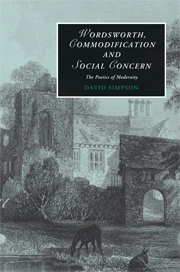Book contents
- Frontmatter
- Contents
- Acknowledgments
- CAMBRIDGE STUDIES IN ROMANTICISM
- Introduction: the ghost and the machine: spectral modernity
- 1 At the limits of sympathy
- 2 At home with homelessness
- 3 Figures in the mist
- 4 Timing modernity: around 1800
- 5 The ghostliness of things
- 6 Living images, still lives
- 7 The scene of reading
- Notes
- Bibliography
- Index
6 - Living images, still lives
Published online by Cambridge University Press: 15 September 2009
- Frontmatter
- Contents
- Acknowledgments
- CAMBRIDGE STUDIES IN ROMANTICISM
- Introduction: the ghost and the machine: spectral modernity
- 1 At the limits of sympathy
- 2 At home with homelessness
- 3 Figures in the mist
- 4 Timing modernity: around 1800
- 5 The ghostliness of things
- 6 Living images, still lives
- 7 The scene of reading
- Notes
- Bibliography
- Index
Summary
NOT ALL ALIVE, NOR DEAD
We have seen in chapter 4 that Wordsworth confesses a desire for frozen time, for memories that are always the same and always recoverable as fixed values, at the same time as he opposes the reification of the imagination (and of life itself) that such fixedness must bring with it. In chapter 5 we saw him standing in awe of the “ghostliness of things” and complicating a conventional antimaterialist metaphysics by invoking a rhetoric of death-in-life, whereby things take life only as specters, incarnations of the already dead. Marx confronted similar aesthetic questions in staging the figuration of the culture of the commodity, devising the fantastic forms of linen talking to coats and tables standing on their heads, bringing apparently inanimate things to life in order to signal the deadness of what we take to be our own lived experiences. Life and death interact in these images of death-in-life and life-in-death; in the spots-of-time experiences, life wishes for the full remembering that could come only in standing outside time and accepts its timeliness only by way of a rhetoric of loss.
In the daffodils poem Wordsworth has found a way of staging a figure of natural life that seems so obviously credible – who could contest the aptness of dancing flowers? – that we might miss completely the steady invocation of economic terms that assimilates incipient poetic cliché to an analysis of private (pseudo)circulation and commodification.
- Type
- Chapter
- Information
- Wordsworth, Commodification, and Social ConcernThe Poetics of Modernity, pp. 174 - 205Publisher: Cambridge University PressPrint publication year: 2009



